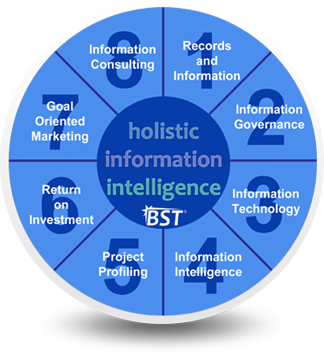Holistic Information Intelligence

"Information is Everything" and Holistic Information Intelligence (HII) is an opportunity to take advantage of when implementing or upgrading IGT related systems such as an Enterprise Content Management solution, organization website or computer infrastructure. As well as protecting existing organization information, legacy information must be protected, archived or disposed of.
The reality is that all organizations are being confronted with tremendous increases in the amount of "asset information" they generate and manage. Organizational assets can be a piece of property or equipment purchased exclusively or primarily for business use. Assets span many categories, such as vehicles, real estate, computers, office furniture and other fixtures. But, information is often overlooked as an organizational asset and it shouldn’t be! Information has definite value just like any other organizational asset.
Information value increases in direct relationship to the people who use it to perform a variety of business functions. However, information can have a short lifecycle and it tends to depreciate over time just like other types of organizational assets. Depending upon the type of information it is, the speed at which it loses its value represents how significant the information will remain throughout its lifecycle.
The Holistic Information Intelligence method and philosophy consist of:
1) Records and Information: Records and Information Management (RIM) should be a part of an organization's broader activities and is associated with Information Governance. It is primarily concerned with the evidence of an organization's activities as well as the reduction or mitigation of risk that may be associated with such evidence.
2: Information Governance: Information Governance (IG) encompasses sets of multi-disciplinary structures, policies, procedures, processes and controls implemented to manage records and information at an enterprise level, supporting an organization's immediate and future regulatory, legal, risk, environmental and operational requirements.
3) Information Technology: Information Technology (IT) is the use of any computers, storage, networking and other physical devices, infrastructure and processes to create, process, store, secure and exchange all forms of electronic information that is property of an organization.
4: Information Intelligence: Information Intelligence (II) brings together Records and Information Management professionals with those who manage Information Technology infrastructures in coordinated efforts with an organization's management and its business processes.
5) Project Profiling: Project Profiling (PP) simplifies descriptions of an organization's information project. In addition to defining the purpose and ownership of the information project, it presents a first estimate of the activities involved and the total investment that will be required, as well as operating costs and, in the case of income generating information projects, the annual income.
6) Return on Investment: Return on Investment (ROI) is a measure that is used to evaluate the efficiency of an investment in an organization's information project.
7) Goal Oriented Marketing: Goal Oriented Marketing (GOM) focuses on outcomes instead of processes in an organization's information project. It is a type of strategy that affects how organizations can be successful in marketing any information endeavor whether it is internal or external of the entity.
8) Information Consulting: Information Consultants (IC) are involved in a variety of activities of an organization's information project including writing records management policy/programs, project management, marketing, client relationship management and systems development.